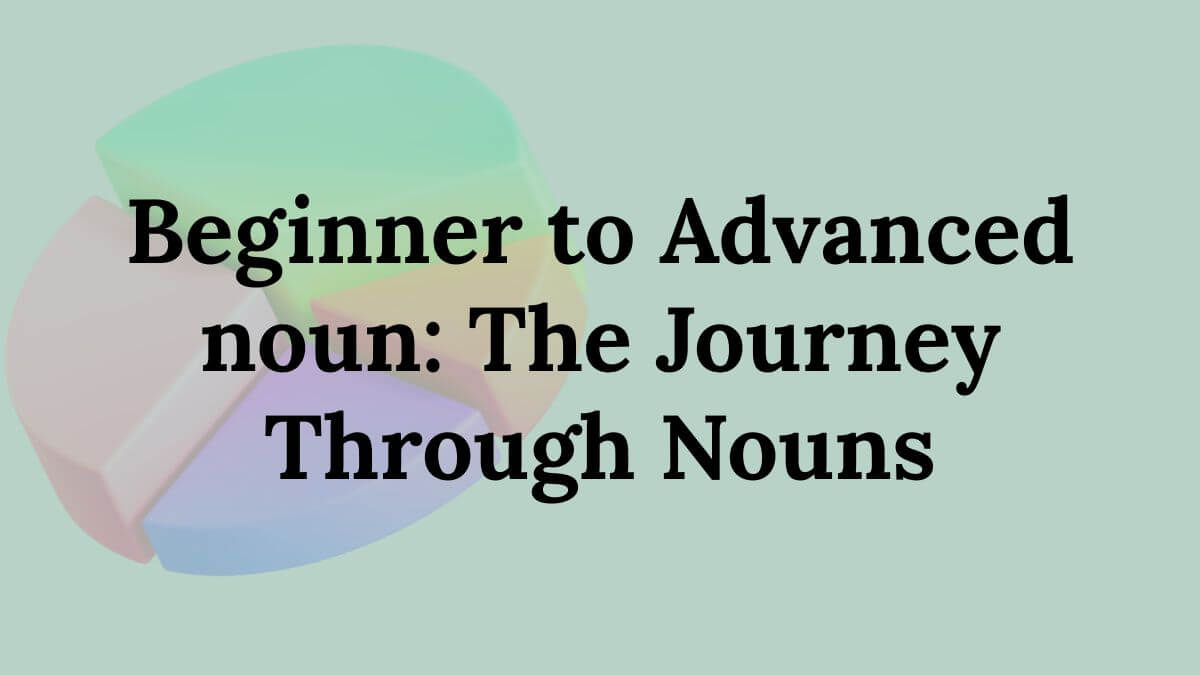Nouns are the foundation of English grammar, playing a crucial role in sentence construction and communication. Whether you are just starting to learn English or aiming to master advanced grammar, understanding nouns is essential. In this post, we will take you on a journey from beginner to advanced noun concepts, helping you grasp their various types, uses, and rules with clear explanations and examples.
What Is a Noun?
A noun is a word that identifies a person, place, object, or concept.. It acts as the subject or object in a sentence, allowing us to identify what or whom we are talking about. Beginner to Advanced noun: The Journey Through Nouns . Beginner to Advanced noun
Examples:
- Person: teacher, doctor, Sara
- Place: city, park, London
- Thing: book, apple, car
- Idea: freedom, happiness, strength
Nouns are everywhere in English, making them one of the first grammar topics learners should master.
Types of Nouns: From Beginner to Advanced Noun Concepts
Common and Proper Nouns
One of the first steps in understanding nouns is distinguishing between common nouns and proper nouns.
- Common nouns name general things or people. They are not capitalized unless they begin a sentence.
Example: dog, city, teacher - Proper nouns name specific people, places, or organizations. These nouns are always capitalized.
Example: Rover (a dog’s name), Paris, Mr. Smith
Countable and Uncountable Nouns
Next, nouns can be countable or uncountable.
- Countable nouns refer to items that can be counted one by one.
- They have singular and plural forms.
Example: one apple, two apples - Uncountable nouns refer to substances or concepts that cannot be counted separately. They usually don’t have a plural form.
Example: milk, information, happiness
Concrete and Abstract Nouns
Concrete nouns name things you can perceive with your five senses.
Example: chair, music, perfume
Abstract nouns represent intangible concepts, emotions, or conditions that you cannot physically touch or see.
Example: freedom, honesty, happiness
Collective Nouns
Collective nouns name groups or collections of people, animals, or things considered as one unit.
Examples: team, flock, audience
Advanced noun Forms and Uses
Compound Nouns
- Compound nouns are created when two or more words join together to form one noun that conveys a unique meaning.
Examples: toothpaste, mother-in-law, basketball
They can appear as a single word, connected with a hyphen, or written as separate words.
Gerunds as Nouns
- Gerunds are verbs ending in -ing that act as nouns within a sentence.
- Example: Swimming is good exercise.
Here, swimming acts as a noun—the subject of the sentence.
Noun Phrases
A noun phrase includes a noun and all its modifiers (like adjectives or articles), making it more descriptive.
- Example: The tall, green tree in the garden
Abstract Noun Formation with Suffixes
Advanced learners often expand their vocabulary by recognizing noun suffixes that form abstract nouns from adjectives or verbs. Beginner to Advanced noun: The Journey Through Nouns .Beginner to Advanced noun
Examples:
-
- happiness (from happy)
- decision (from decide)
- friendship (from a friend)
Using Nouns Correctly in Sentences
Singular and Plural Forms
Most nouns have singular and plural forms.
- Singular: book
- Plural: books
Some nouns have irregular plural forms:
- man → men
- child → children
- mouse → mice
Possessive Nouns
To show ownership, nouns use an apostrophe:
- Singular possessive: The girl’s book
- Plural possessive: The students’ classroom
Articles with Nouns
Articles (a, an, the) often precede nouns:
- Use a before consonant sounds (a cat)
- Use an before vowel sounds (an apple)
- Use them for specific or previously mentioned nouns
Tips for Mastering Nouns: Beginner to Advanced noun Learning
- Read and listen to English often to see nouns in context.
- Practice identifying different types of nouns in sentences.
- Create your own sentences using common, proper, countable, and uncountable nouns.
- Learn irregular plural forms to avoid common mistakes.
- Use noun phrases to make your writing more descriptive.
- Notice how gerunds and abstract nouns are used in advanced texts.
Beginner to Advanced noun
Read More:
I Disagree With You – 25 Strong Alternative Ways to Say
Basic Sentence Structure Made Easy With Clear Examples
Conclusion: Your Journey Through Nouns
Mastering nouns from beginner to advanced noun levels is a vital step on your English learning journey. By understanding the different types, forms, and functions of nouns, you build a strong foundation for both writing and speaking. Remember, practice is key—keep reading, writing, and exploring nouns in everyday language. With time and effort, nouns will become one of your grammar strengths. Beginner to Advanced Noun: The Journey Through Nouns. Beginner to Advanced noun
